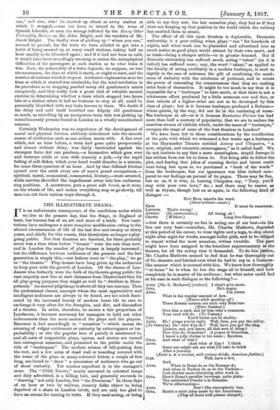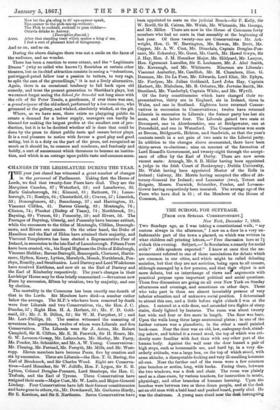THE 1 - 1 - .LEGITIMATE DRAMA.
IT is an unfortunate consequence of the conditions under which we live at the present day, that the Stage, in England at least, has become less of an art and more of a trade. Few insti- tutions have undergone a more complete modification owing to the altered circumstances of life of the last five and twenty or thirty years, and chiefly for this reason, that there:mdsts no longer a play- going public. Not that theatres are deserted, for there probably never was a time when better " houses " were the rule than now, and in London the number of play-houses is largely increased ; but the•difference between audiences of the present and the last generation is simply this,—our fathers went to "the play," we go to " the theatre." Play-houses have long given up the endeavour to keep pace with the growth of London. Of the classes of Lon- doners who formerly were the bulk of the theatre-going public the vast majority now live at such.distanees from Theatreland that for all play-going purposes they might as well be" dwellers in Meso- potamia." An annual pilgrimage is about all they can manage. Then the professional classes, amongst whom the most appreciative and intelligent audiences are always to be found, are too much fasci- nated by the increased luxury of modern home life to care to exchange it very often for the draughts, and dirt, and discomfort of a theatre. In order, therefore, to secure a fair proportion of Londoners, it becomes necessary for managers to hold out other inducements than the mere names of the playa and the players. Recourse is had accordingly to "sensation "—which means the arousing of vulgar excitement or curiosity by extravagance or im- probability; or else the popular love of parody is ministered to, and all sorts of respectable plays, -operas, and stories are turned into outrageous nonsense, and presented to the public under the title of "burlesques." The modern science of bill-posting does the rest, and a few acres of dead wall or hoarding covered with the name of the piece in many-coloured letters a couple of feet long, are found to " draw " a succession of audiences who go out of sheer curiosity. Yet another expedient is in the manager's store. The "104th NIGHT," neatly executed in coloured lamps and duly advertised, is a killing bait, and generally succeeds in " drawing " not only London, but "the Provinces." In these days of an hour or two by railway, country folks object to being deprived of a share in London revels, and are only too glad to have an excuse for coming to town. If they omit seeing, or being
able to say they saw, the last sensation play, they feel as if they were not keeping up that position in the world which the railway has enabled them to attain.
The effect of all this upon theatres is deplorable. Dramatic authorship is a poor calling when plays " run " for hundreds of nights, and when trash can be placarded and advertised into as much notice as good plays would attract by their own merit, and so trash—being a cheaper article—is in greater demand. But if dramatic authorship has suffered much, acting "talent" (as it is called) has suffered more ; nay, the word "talent," as applied to the faculty of acting creditably in a modern burlesque, is used to signify in the case of actresses the gift of combining the maxi- mum of audacity with the minimum of petticoat, and in actors the power of concealing the consciousness that they are making utter fools of themselves. It might be too much to say that it is impossible for a " burlesque " to have merit, or that there is not a wholesome effect produced by a little nonsense now and then, or that talents of a higher order are not to be developed by this class of plays ; but is it because burlesque produced a Robson— whose genius, by the way, did not lie in the rendering of sense- less burlesque at all—or is it because Bombastes Furioso has had more than half a century of popularity, that we are to endure the ceaseless stream of rubbish which, under the name of "burlesque," occupies the stage of some of the best theatres in London?
We have been led, to these considerations by the recollection of the pain with which we witnessed a few weeks ago a burlesque at the Haymarket Theatre entitled Antony and Cleopatra, "a new, original, and eccentric extravaganza," as it called itself. We do not hesitate to say that a more meaningless, stupid farrago it has seldom been our lot to listen to. Not being able to follow the plot, and fearing that jokes of cunning device and latent merit were being lost upon us, we purchased a book of the words" from the boxkeeper, but our ignorance was bliss indeed com- pared to our feelings on perusal of its pages. There may be fan, lost on us, it is true, in hearing Cleopatra say, "Tony, you'll stay with your own love," &c. ; and these may be reason as well as rhyme, though lost on us again, in the following kind of dialogue :— Now Eros, smart's the word.
(Shout without—music)
Eaos. It must be smatterer. LEFIDUS. That's wrong ! Aarroar. (In consternation.) All wrong, oh !
CaowD. ( Without.) Long live Cleopatra!
—but there is certainly no fun in seeing one of our best—in his line our very best—comedian, Mr. Charles Mathews, degraded at this period of his career, to wear tights and a toga, to skip about night after night for weeks, amongst ballet girls, and to be obliged to repeat withal the most senseless, witless twaddle. The part might have been assigned to the humblest supernumerary at the theatre, for all the acting that it demanded. To do him justice, Mr. Charles Mathews seemed to feel that he was thoroughly out of his element, and hurried over what he had to say in a business- like manner which is unusual with him. We know how thoroughly "at home" he is when he has the stage all to himself, and how completely he is master of his audience ; but what actor could_ feel at his ease in each dialogue as the following ?— Ater°. [Mr. C. Mathews] (without) I shan't give more.
He's angry.
Atm. I'm aware What is the regular amount of fare. (Enters while speaking of) These Roman carmen are such very Rum'uns.
(Enter Gamut.) Give him a card, and let him take a summons. Your card will do. (To C/ESAR.)
You'd better not be shabby.
Atm. Rh! p'raps you're right. Well, then, you pay the cabby.
(To Gemara) Ah ! how d'ye do ? Well, have you got the ring,
Licence, and, you know, all that sort of thing ? How d'ye do, Gracchus ? A propos of Gracchus, I know a jolly rhyme to his name ; Bacchus.
GRAO. And what of him ?
ANTO. And what of him ? I think
Some one might ask me what I'll take to drink After a journey.
(Enter L. H. a servant, with various drinks, Anzerican fashion.) Wes. Well, have a few, Iced.
When in Rome do as the Romans do, And when in Turkey do as do the Turkiea- Cool sherbet most refreshing after work is.
Ocre. Here's Rome's peculiar beverage, quite plain: The celebrated Poncho it la Romaine. We've effervescing- Asto. Don't like atmospheric 'mu. OOTA. Here's a mint julep made by the Americans. (They all stand with glasses charged.) Now let the gin-sling to th' eye-opener speak, Eye-opener to the pick-me-up-without ; The Pick to cocktail, cocktail to gam tickler- Octavia drinks to Antony.
(Descriptive flourish.)
Arno. After that standing toast which makes a king o' me I feel a sort of pleasant kind of thingummy.
And so on, and so on.
During the above dialogue there was not a smile on the faces of the audience, and no wonder.
There has been a reaction to some extent, and the "Legitimate Drama" (why so called who knows?) flourishes at certain other theatres, but as its chief attraction consists in seeing a "robustious, periwigged-pated fellow tear a passion to tatters, to very rags, to split the ears of the groundlings," it is not a lively alternative. Again, there is an occasional tendency to fall back upon old comedy, and treat the present generation to Sheridan's plays, but we cannot forget seeing the School for Scandal not long since with the role of Sir Peter Teazle, a gentleman, if ever there was one, a grand seigneur of the old school, performed by a low comedian, who grimaced at the gallery, and winked, absolutely winked, at the pit.
Where, as we have seen, there exists no playgoing public .'to =create a demand for a better supply, managers can hardly be blamed for making the largest profits at the smallest cost of pro- duction, but it is to be doubted whether all is done that could be done by the press to direct public taste Etnd ensure better plays. It is a real pleasure to notice with favour a good play and good acting, but it is a duty on the part of the press, not recognized as much as it should be, to censure and condemn, and fearlessly and boldly, a sort of amusement which threatens to become an institu- tion, and which is an outrage upon public taste and common sense.





































 Previous page
Previous page